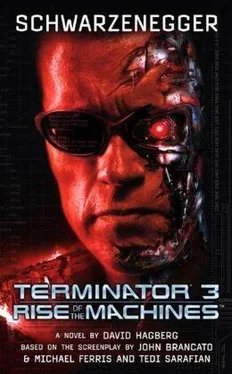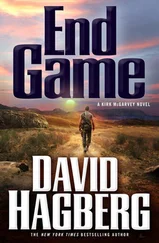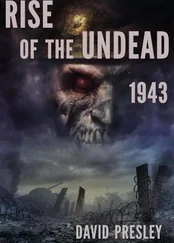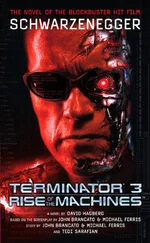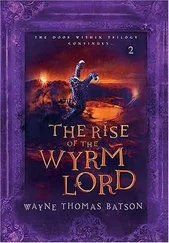David Hagberg
Terminator 3: Rise of the Machines
July 2029, Outside What Was Colorado Springs, Colorado
Travel anywhere for humans had become next to impossible over the last twenty years with the intensification of the machine wars.
Human settlements, sometimes hanging on only by sheer determination, were critically important because they were the last pockets of resistance. They also were important because of the sharp decrease in the human birth rate. Who wanted to bring a child into a world of chaos, death, and destruction? These days the sparks of human existence were reduced to dim flickers around the world.
The center for machine activity and Skynet control was two thousand feet beneath Navajo Mountain near the Continental Divide west of the Colorado Springs. The installation had been home to old U.S. military installations. Since Judgment Day when Skynet started and conducted the global thermonuclear war that all but wiped human beings off the face of the earth, Navajo Mountain had become the primary target for the human resistance.
Skynet's Artificial Intelligence unit anticipated this, of course, so it began the systematic extermination of all human life in ever-expanding circles starting with Navajo Mountain itself, then spreading throughout the Rocky Mountains and beyond.
The years had taken their toll. In the Navajo Mountain Strategic Region there'd only been Air Force Colonel Steve Earle and a handful of resistance fighters: Academy instructors and students, local cops, and a few firefighters.
After years in hiding, tramping around the mountains, evading machine search-and-destroy patrols, they had stumbled upon one unguarded, unblocked ventilation shaft into the heart of the mountain. A back door.
Their plan was to send a five-kiloton suitcase-size nuclear demolition device down the shaft to explode in the inner chamber of Skynet's AI. Kill the brain and the body would of necessity stop functioning.
Colonel Earle and his band of volunteers had started the mission clock at 1800 GMT on June 1.
That was thirty days ago.
No one had heard from them since, and Skynet continued to function.
Lieutenant Joel Benson, 1st Resistance Rangers Special Incursion Unit Red One, pulled himself the last few meters to the top of the rocky ridgeline. It had snowed last night, and he and his four operators were damn cold. They had nothing like this in Los Angeles. Not even in the mountains. Not on a first of July.
He raised his vintage Steiner mil specs light-intensifying binoculars to study the broad road that led up from the main highway and old Interstate 25. It switched back and forth in angry slashes through living rock over the extremely steep gradients.
Human engineering, Benson thought bitterly. There wasn't much of that these days; no bridges were being constructed, no new dams, new airports, new ocean liners. There was only destruction. He could smell death and decay deep behind his nostrils, taste it at the back of his throat It was everywhere.
Benson scoped the access road, following it to the massive traffic jam that Colonel Earle had described for them. When Skynet closed the blast doors, and word started to get out what was happening, those personnel who were caught on the outside tried to get away from what they figured would be ground zero.
Skynet had anticipated that The road out from the installation's main entrance had been lined with the old Cyber Research Systems T-l-5 and T-l-7 warrior robots armed with 50-caliber depleted uranium chainguns capable of firing nearly three thousand rounds per minute. Like the old Navy's Phalanx systems mounted on aircraft carriers, the guns were directed by a sophisticated onboard suite of radar, infrared, and optical sensors.
There had been no escape for any human caught on the access road that evening.
Their bodies, hundreds of them, were still down there, mummified by the super dry, high mountain air. Nothing moved.
Payback time, Benson thought, pulling back below the ridgeline. Not only for the people on the road and the untold hundreds and thousands of millions around the world, but for his own wife, Jane, and their three children killed in a machine ambush three years ago in the San Bernadino massacre.
At one meter eighty, Benson carried his hundred kilograms with the compact ease of a trained athlete. His dark, luminescent eyes never seemed to miss much. His friends swore that he was more efficient and more reliable than a reprogrammed T-850, and even the few people who sometimes found his manner abrasive conceded that he would be a good man to cover your ass in a knockdown brawl.
But sometimes he wore a bitter halo because of how his family had died. If the truth were known, he was even more dedicated and motivated than any T-800 robot that ever came out of Skynet's manufactories. He had just cause.
Benson's number two, Sergeant Toni Battaglia, huddled beneath a snow-covered rock overhang talking into the mike on the lapel of her white camos. The resistance was down to one radiation-hardened KH-15 surveillance/ communications satellite that Skynet hadn't managed to take out yet They used a forward scatter encryption program that was so crude and so old that so far as they knew the machines had not yet been able to break it No one thought that the situation could last much longer, though Benson personally felt that Skynet simply did not care. It was a supreme gesture of arrogance.
"Looks like we're in the clear," Benson told her. "No ground-based defense towers that I could see. And no H-Ks in the air."
H-Ks, or Hunter-Killers, were helicopterlike machines that had been designed by CRS in California for one purpose and one purpose alone: to detect and kill human beings, whenever and wherever. They were fully automatic and damned difficult to bring down. Everyone gave them a great deal of respect Toni relayed the information to Home Plate, the resistance's headquarters deep underground of what had been Beverly Hills. She had lost her husband and one child in the San Bernadino battle and like Benson, she was having trouble regaining her capacity to love again, but also like Benson she had thrown herself into her work.
Toni held her earpiece closer. She looked up. "John wants to know if we've been spotted?"
"Apparently not. But tell him that we haven't seen any sign of Steve or his people either."
She nodded and spoke softly into the mike. She looked up again. "When are we making the incursion?"
Benson glanced at his watch. "It'll be dark in an hour. We'll head to the other side now. It'll take at least that long to get over there."
She relayed his message. "John says, 'Kick some machine ass.'"
Benson had to smile. It wasn't exactly religion, not in this day and age, but it was as close as many of them could get.
Corporals Simon Anders and Bill Taggert trudged up the steep ravine with Dr. Donald Hess, their machine systems and programs expert, from where they had finished camouflaging their Humvee from detection by a chance flyover of an H-K. Their M-28 assault rifles were slung over their shoulders, barrels down. They were bright kids who had grown up after the blowup, never knowing the old life. Traveling cross-country all the way from Los Angeles to Colorado, across the deserts and over old mountain pass roads at night, had been an exciting adventure for them. Before now they'd never been more than twenty miles from where they were born. But they were highly trained and very efficient killers — of machines, not people.
"Everything's covered?" Benson asked.
"We packed snow against the muffler and tailpipe, and piled the hood," Hess assured him. "No heat signature."
Benson nodded. Hess was an egghead who looked like a blond surfing bum from another era, but he was well liked. He was smart, but he wasn't afraid to get his hands dirty. Like just about every human left on earth, he had lost someone close to him. He had cause.
Читать дальше
